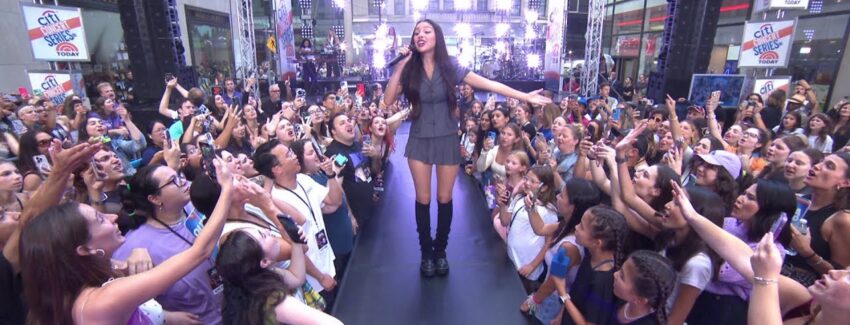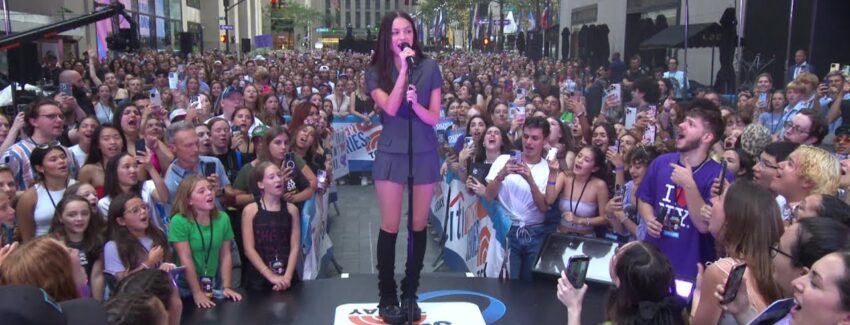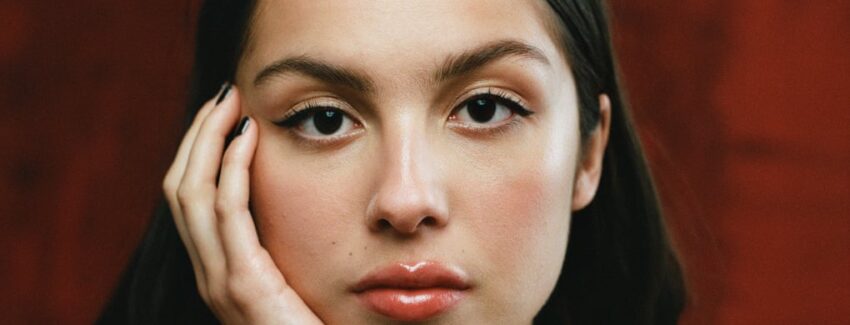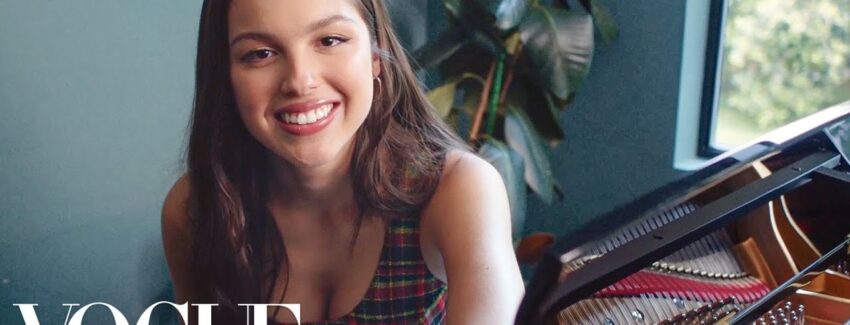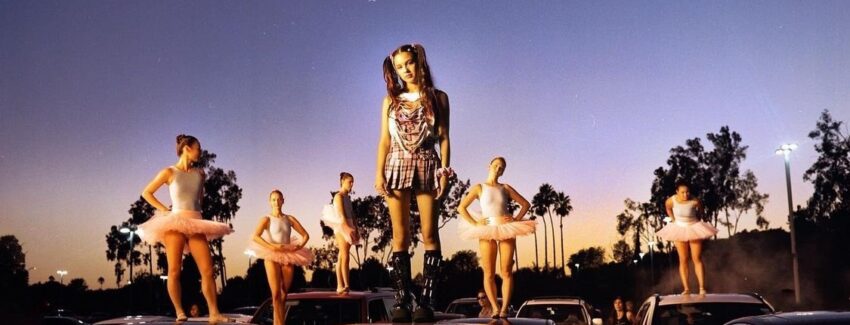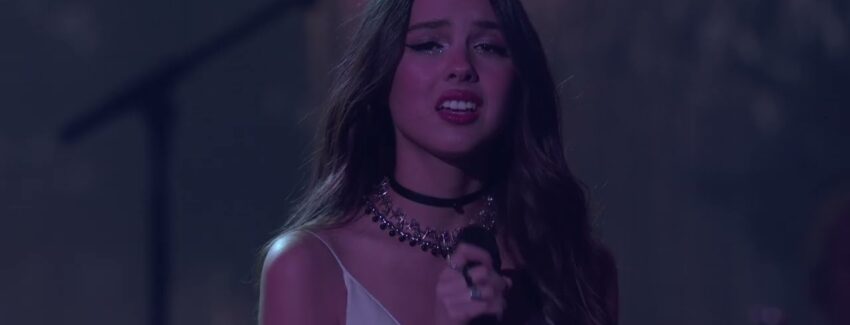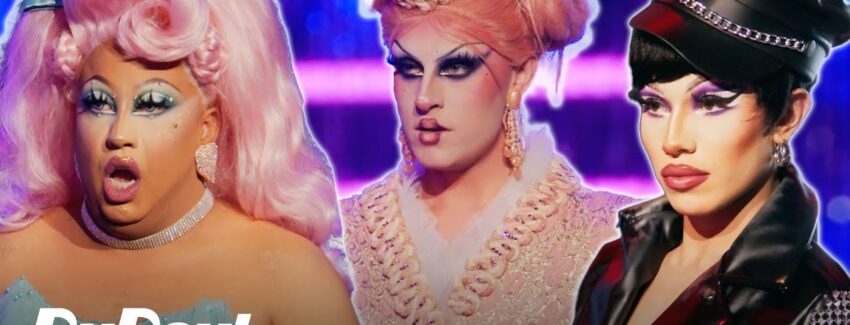[embedyt]https://youtu.be/AdoLMCnU1F0[/embedyt]
Category: SOUR
drivers license | Live from ‘The Today Show’
[embedyt]https://www.youtube.com/watch?v=04wofn8J1Ts[/embedyt]
Olivia Rodrigo on Overnight Superstardom, Plagiarism & Growing Up in Public
She was a TV child star – then the single Drivers License made her a music phenomenon. Now on her second album, the singer is trying to make sense of her extraordinary young life
Of all the highlights of Olivia Rodrigo’s first two years as a pop star – breaking streaming records with her heartbroken debut single Drivers License aged 17; helping President Biden encourage young people to get vaccinated; winning three Grammys after she released her debut album, Sour – her set at Glastonbury 2022 still stands out. Rodrigo already had big plans for her Saturday afternoon performance: she asked Lily Allen if they could duet on her favourite song by the British pop star, her 2009 hit Fuck You. Then the day before Rodrigo was due to play, Roe v Wade was overturned, removing the federal right to abortion in the US. She was in London. “We were all like, we should stay here,” Rodrigo, 20, says when we meet in August in Pasadena, the LA–adjacent city where she lived as a teenager. “We were so devastated, crying because it felt so surreal and so awful.” Then Allen texted her. “She goes, ‘See the news? I guess we know who we’re gonna dedicate this song to.'”
Allen recalls Rodrigo pacing backstage, memorising her speech. On stage, Rodrigo said: “I’m devastated and terrified, and so many women and so many girls are going to die because of this,” then dedicated Fuck You to “the five members of the supreme court who have shown us that, at the end of the day, they truly don’t give a shit about freedom”, listing them by name. “We hate you,” Rodrigo said, then danced around with Allen, middle fingers flipped. It was perfect, meeting incomprehensible injustice with petulant anger. That’s what music’s for, says Rodrigo, “expressing your rage and dissatisfaction”.
If there was a backlash, she didn’t see it. Before she was a pop star, Rodrigo had been a Disney Channel actor since the age of 12, most notably a lead in the meta mockumentary High School Musical: The Musical: The Series, in which a group of teenagers stage a theatrical production of the Zac Efron juggernaut. The Disney–to–pop pipeline is well trodden, and it usually takes a long time for young women making that transition to find anything close to free expression, straitened by America’s puritanical double standards and the commercial imperative/threat to be a good role model. (Historically it has arrived in a repressed explosion of latex and panting, long before the considered political statements.)
Before Rodrigo’s set, she considered her many “young girl fans, which I always think about”, and concluded: “That’s actually why it’s so important – I would love, if I was a little girl, to see someone stand up for future–me like that.” (Allen can testify to her young fan contingent: when she got Rodrigo’s invitation, she says, “my daughter saw the email and was like, ‘If you don’t do it, I will kill you.'”) Even when Rodrigo was at Disney, she would tweet her anger about issues such as Trump’s various misdeeds, or the murder of George Floyd. Similarly, if there was kickback, she recalls, “I didn’t really pay attention to it or let it affect me.” Being a puppet, she says, “doesn’t work any more”.
Rodrigo and I meet in a cafe a few weeks after her rampaging comeback single, Vampire – the first taste of her second album – hit number one in the US. In the queue, she says this is her “favourite joint” because it’s where Timothée Chalamet’s character works in Greta Gerwig’s Lady Bird. More significantly, it is where she found out, at 16, that she had landed High School Musical: The Musical: The Series (having previously starred in Disney’s Bizaardvark, about two offbeat tween bloggers). Rodrigo orders an iced chai latte and points out the table where she was revising for “chemistry or something bad” when she got the call. She would never attend real high school, instead studying on the sets of both shows.
Rodrigo, a music nut since she was little, was also a budding songwriter with a readymade audience for the demos she shared online, though she worried that they wouldn’t connect because her life was so unusual. (It’s striking that she sort of picks a film set for us to meet on.) Then Disney execs invited her to write an original song for her High School Musical: The Musical: The Series character. After the piano ballad All I Want went viral, Rodrigo sought a record deal. Unlike her Disney forebears Miley Cyrus, Selena Gomez and Demi Lovato, she chose not to make (inevitably sanitised) music for the corporation’s in–house label, and picked Interscope/Geffen because they were the only label she met that perceived her as a songwriter, not a pop star, and didn’t blow smoke up her ass.
If High School Musical: The Musical: The Series made Rodrigo a star to gen Z, Drivers License, released in January 2021, made her a household name. Another piano–led epic, albeit with the very un–Disney climax “I still fucking love you”, it provided mass catharsis during that desolate winter lockdown and hit number one worldwide. Her first live performance was at the Brit awards, where she met her childhood hero Taylor Swift; her second was on Saturday Night Live just days later. She wrote her Grammy–winning debut album with producer Daniel Nigro, wielding balladry and pop–punk to excavate her first heartbreak.
Rodrigo was the first pop act to break through to superstardom since Billie Eilish (and the first Filipina–American), though the immediacy of her success meant she didn’t have the buffer of a rise through tastemaker blogs like Eilish – or even Swift’s country–music cosseting – to find her feet. She also still had to graduate from virtual high school… and film another season of High School Musical: The Musical: The Series. When I first interviewed her, back in 2021, she was studying for finals, and ultimately got a 4.1 grade point average (essentially A+). “I did my AP classes [university–level courses offered at high school]. I was very focused on it,” she says as we head to an outside bench. “I was a good student.”
I’ve always struggled with wanting to be this perfect American girl and the reality of not feeling like that all the time
And not since Britney Spears had a former Disney star come to dominate pop culture so suddenly – Sour gave Rodrigo a second number one in the pop–punk rager Good 4 U – though by comparison Rodrigo had total control over her career, demonstrating the evolution of the archetypal female pop superstar over the past 25 years. She bristles at the idea of being a “pop star”, yet seems a good student of her predecessors – the cautionary tales and the stakes of failure – and managed her supercharged ascent with striking caution. Rather than play arenas just because she could, Rodrigo toured smaller theatres to develop her fledgling stagecraft. She seldom intentionally made headlines beyond her musical activity. It wasn’t that calculated, she says. “It’s not like I was like: ‘In order to have a sustainable career, I’m gonna roll it out slowly and this and that.’ I kind of had overnight success. I’d been working on songs for years and preparing for that moment for a long time. But in many respects it was very instantaneous, and so taking things slower was my way of coping.”
That approach was partly induced by the media obsession with the breakup behind Drivers License, which felt fairly disgraceful given that it essentially involved kids barely of age. (Rodrigo’s assumed ex, her High School Musical: The Musical: The Series co–star Joshua Bassett, ended up hospitalised with heart failure from the stress caused by press scrutiny.) As gossip vultures swirled, Rodrigo disconnected from social media and pledged to remain “low–key” in her fame. Today, no one notices the slight 20–year–old in a black T–shirt and long khaki skirt she found on Depop – leaving her sweet security guard in peace with the crossword. “All of the drama that surrounded Drivers License was baptism by fire,” she says. Cleaving her personal identity from her celebrity persona became a priority she worked through in therapy. “I’m happiest when I can separate the two.”
Rodrigo calls her debut headline tour the “ultimate practice” in maintaining that distinction, learning to equally enjoy being a performer and then being “able to be in my bus alone”. She’s conscious of the risks in that potential gulf. “I think that’s why so many artists do drugs, because they’re trying to recreate that high of being on stage.”
When Rodrigo released Sour, she said she was proud that it contained the kind of messy emotions that young women aren’t meant to exhibit, a mission statement that her apparently uninhibited rise bore out. It seemed as though she had beaten the game. But her second album, Guts, starts with All–American Bitch, a satirical diatribe against the expectations and double standards she still feels bound by. “I’ve experienced a lot of emotional turmoil over having all these feelings of rage and dissatisfaction that I felt like I couldn’t express, especially in my job,” she says. “I’ve always felt like: you can never admit it, be so grateful all the time, so many people want this position. And that causes a lot of repressed feelings. I’ve always struggled with wanting to be this perfect American girl and the reality of not feeling like that all the time.”
A committed teenage perfectionist, she finds it hard to express messy emotions in general, she says. Rodrigo is noticeably more at ease than when we spoke in 2021, when she was still bright with media training, though she’s clearly tired, repeatedly apologises for having a “mushy” brain, and hesitates at specifics. Writing songs is less about expressing herself and more about finding out how she feels, she says. “A song is so not good if I can tell it’s coming from a disingenuous place. It’s like a little lie–detector test, a polygraph.”
When Rodrigo started attempting to write her second album, the polygraph wouldn’t even twitch. She had thought of the title Guts – as in instinct, conviction, life’s dank parts – when writing Sour. But the songs didn’t come as easily. “There were a good few months where I would sit at the piano and all I would think about was how I was never going to make something as good, or all the mean things that people on Twitter would say, or how I wasn’t as good as … whatever,” she says. Last August, she started sessions at Daniel Nigro’s garage studio, where they made Sour. She eschewed fancier surroundings: “Adding a new studio to the mix would have meant more anxiety and doubt. Like: ‘Oh my God, we’re spending thousands of dollars and I feel like I’m not writing anything good.'” Some days, she just went in and cried. She says this while smiling, but it sounds punishing. “It’s the antithesis of creativity,” she admits.
Also the antithesis of creativity: the current climate where inspiration can quickly become a copyright issue. Sour was plagued by it: after listeners noted similarities between Rodrigo’s song Deja Vu (an ecstatic skewering of her ex for rehashing their favourite pastimes with his new girlfriend) and Taylor Swift’s Cruel Summer, as well as between her Good 4 U and Paramore’s Misery Business, Rodrigo ended up giving both acts 50% of the credits and royalties for the respective tracks. (Elvis Costello was more sanguine about her song Brutal’s echoes of his Pump It Up: “It’s how rock and roll works,” he tweeted in response to criticism of her. “You take the broken pieces of another thrill and make a brand new toy.” See also Rodrigo’s prescient yell in Deja Vu: “Everything is all reused!”)
At the time, she said it was “disappointing to see people take things out of context and discredit any young woman’s work”. Did the potential for similar scrutiny make her second–guess writing Guts? She grows vague. “I was so green as to how the music industry worked, the litigious side … I feel like now I know so much more about the industry and I just feel … better equipped in that regard. It wasn’t something I thought about too much.”
Some fans are convinced that Vampire – specifically the yelled “bloodsucker, fame fucker, bleedin’ me dry like a goddamn Vampire!” – is about Swift, especially given that signs of their budding friendship vanished after the credits issue. (Swift recently invited Sabrina Carpenter, the rumoured other party in the Drivers License heartbreak, to support her Eras tour.) “How do I answer this?” Rodrigo whispers at the table when I ask her. “I mean, I never want to say who any of my songs are about. I’ve never done that before in my career and probably won’t. I think it’s better to not pigeonhole a song to being about this one thing.” She laughs nervously (she often laughs nervously). “I was very surprised when people thought that.”
Reading Julia Cameron’s creative guide The Artist’s Way pushed Rodrigo past self–criticism, and taking breaks with Nigro’s baby gave her perspective. “When you’re worried – like, ‘Oh my God, what’s Pitchfork gonna think?'” she says with strangled mockery – “you see a baby and you’re like, this is love and light right here.” She and Nigro brought in new co–writers to freshen their process, and because Rodrigo wanted to learn from other people: “It’s really hard to learn songwriting from a book.” Her musical hero Jack White also wrote to her offering three bullet points of advice, including to write what she wanted to hear on the radio. “I was going through such a hard time,” she says, “but for some reason, reading that, I was like, ‘Oh my God! That’s exactly what I need to do.'”
Rodrigo sought to channel the energy she had felt live as fans rampaged to her heavier songs – “the most invigorating feeling ever”. Although there is some of her trademark balladry on Guts, it mostly features tart, agitated rock that draws from British indie (Wet Leg), US alternative (Beck, Smashing Pumpkins) and the feminist punk that Rodrigo’s mum introduced her to as a kid (the Waitresses). (A good student, again.) Rodrigo’s frustration – with men, gender norms, her job – boils over with exhilarating immediacy.
I worked my whole childhood and I’m never going to get it back. I didn’t go to football games, I didn’t have a group of girlfriends that I hung out with after school.
It’s extremely funny in parts, delivered with gusto by a singer who has sometimes been criticised for sounding stagey, but who knows how to sell a line–read: “Yes I know that he’s my ex / But can’t two people reconnect? / ‘I only see him as a friend’ / The biggest lie I ever said!” goes the nihilistic chant Bad Idea Right?, which throbs with the defiant high of intentional self–sabotage and concludes: “I just tripped and fell into his bed!” Rodrigo puts the humour down to being happier than when she made Sour. “I’m not demolished by my first 17–year–old heartbreak. It’s fun to be playful and not take yourself too seriously.”
But Guts is also strikingly sad: disillusioned about the gap between expectation and reality; musing on social anxiety, exploitative relationships, the toll of idealisation. Thematically, it resembles Billie Eilish’s second album, Happier Than Ever, suggesting a consistent pathology to young fame. (When Rodrigo heard Eilish’s album, she felt: “Oh my God, this bitch read my diary!”)
There are several songs about being gaslit by chaotic older men. “Said I was too young / I was too soft / Can’t take a joke / Can’t get you off,” Rodrigo seethes on the spare Logical. Vampire is primarily about a romantic relationship with an older guy, and Rodrigo says the crescendoing rock opera mirrors her burgeoning revelations about being manipulated. Conflicted experiences with older men have been a recent theme in pop, with songs by Swift, Eilish, Demi Lovato and Phoebe Bridgers resonating with a post–#MeToo generation alert to exploitative power dynamics. Rodrigo demurs at calling her relationships abusive. “I don’t really know the exact definition. I’d just describe it as not great!” She laughs grimly. “Not ideal.”
Guts isn’t a breakup album, she clarifies. “It’s so much about growing up and finding your footing in the world.” One standout, the wall–of–sound lament Making the Bed, is about Rodrigo coming to distrust herself as newfound stardom briefly warped her priorities: pushing away the people who know her and “getting drunk at a club with my fair–weather friends” – all the living she had been doing in secret. “I was 19 and had all this zest for life but also was in this industry for the first time, and that can be kind of alluring: Ooh, there’s all these exciting people and exciting things, all these fancy, shiny new toys.”
What was she buying into? She hesitates again. “Like weird, interesting friends, or getting caught up in artificial interpretations of yourself. I say all this about separating person from persona, but it’s a strange thing when you become successful and get noticed for songs that are super raw and intimate, so on a certain level you feel like people really know you – and they do, but not in the way that your friends or family would know you. It’s a little bit of a tricky situation.”
She asks what the question was and apologises again for feeling “mushy”. “There’s such an archetype of what a ‘pop star’ should be,” she continues. “I never really thought of myself as that, it’s the term that people throw around. Things you should wear and do and how you should be accessible at all times. And ‘date this person and do that’.” I wonder if she watched The Idol, the disastrous HBO drama about a young female singer, the machinations of the pop industry and its festering slick of hangers–on. “Oh no,” she says. “I don’t have the desire to. I remember walking out of Barbie and being like, ‘Wow, it’s so long since I’ve seen a movie that is female–centred in a way that isn’t sexual or about her pain or her being traumatised.'”
That’s another reason why Guts was harder to write, says Rodrigo: being forced to confront uncomfortable truths about her own life. She also had to navigate how to write about the pitfalls of fame while remaining relatable. Even putting “fame–fucker” in Vampire, she says, “I was like, ‘Oh my God, I’m gonna isolate people.'”
When Rodrigo turned 20 in February, she says she became overwhelmed by sadness: “Like, ‘Oh shit, I worked my whole childhood and I’m never going to get it back.’ I didn’t go to football games, I didn’t have this group of girlfriends that I hung out with after school. That’s kind of sad.” She says this blithely, with a shruggy caveat: “Overshare.”
As a young child, Rodrigo was determined to make it. Her unshowbiz teacher mum and therapist dad supported her fruitless auditions, but one day suggested she quit if she didn’t land the next one. (“My family is so wonderfully removed,” she says. “They’re so supportive, but zero pressure – they have been since I was a little child actor.”) Then she scored the lead in an American Girl doll franchise movie. By 12, she had made it to Disney. When we spoke in 2021, I asked Rodrigo if she had felt looked after there. She politely declined to answer, calling it a “hot topic” and fearing she would “get my foot in my mouth”. She’s since left after Disney allowed her to break her contract for High School Musical: The Musical: The Series‘s fourth and final season. I ask if she can answer now. “I can’t believe I said that,” she says quietly. “I think it’s an interesting situation to be so young working at that level. It’s really easy to feel trivialised or not taken seriously or … I don’t know, my mind is so mushy right now,” she whispers, then holds her throat in both hands and blows out her cheeks.
“It’s just really hard to be a kid and an actor, and you can feel maybe a little taken advantage of sometimes,” she says. “The responsibility, feeling criticised in public, feeling like you have to work so much and you see your friends who can go to pool parties and hang out, and you’re stuck on set.” But, she insists, “I wouldn’t have it any other way.”
Rodrigo still seems worried about getting her foot in her mouth. A few days after we meet, she emails me to clarify her gratitude for Disney giving her “such an amazing opportunity” and facilitating her early departure. “I definitely felt how stressful it was to have two full–time jobs – songwriting and acting – and to do them both well,” she writes. “I always knew I wanted to pursue music and focus on songwriting, but at that time it proved difficult to balance both obligations.”
If she has any explicit grievances with her status, it’s how her perceived maturity can be exploited by an industry that puts a premium on women’s youth and beauty. “They always used to praise me for being this precocious young girl,” she says, in Pasadena. “That’s so much of the praise I get, that I’m so impressive cos I’m so young doing this.” Guts closes with a slow, sad song called Teenage Dream that couldn’t be further from Katy Perry’s euphoric, life–is–a–buffet banger of the same name. It’s about Rodrigo’s realisation “that it wasn’t always going to be that way and wondering what I would lose or how I would become less attractive in certain ways to people”.
She internalised that mentality. “Last time you talked to me,” she says, “I just remember thinking, ‘I’m so precocious, I know what I’m doing, I got all this under control, I’m so mature.’ And the older I get, the more I realise that I know very little.”
Nevertheless, Rodrigo is gambling on losing her precocity, determined that her music should reflect her burgeoning adult reality. Making Guts “a little dirtier, maybe, drinking, a little sexier was never a calculated decision. It never has been. They said that about Sour: ‘A Disney kid saying “fuck” in a song! She did that to break from the mould!’ No, I did that because that’s how I talk.” She’s clear that she doesn’t regret any of what she sings about on it. “I wouldn’t have learned it otherwise. You have to go through something to learn about it. You can’t be told that it’s not going to work.”
Guts features several lyrics about drinking, but Rodrigo isn’t yet of age in the US. Do bars make exceptions for celebs? “You know, every place is different,” she blurts. “Who knows!” Being so recognisable, surely she would struggle to have a fake ID. “No, I know,” she laughs. “I’m just so scared. I am such a goody two–shoes. If someone gives me alcohol at a restaurant, I’ll be like, ‘Thanks!’ But if they’re like: ‘Do you have an ID?’ I’m like …” – she gasps – “‘No, no, I’m 20, I promise, I’m sorry!’ I’m such a bad liar.”
I feel super mature in some ways and super stunted in others cos of how I’ve grown up. How am I ever going to learn if I can’t make a mistake in the privacy of my own life?
But after “swinging too far in the direction of social life”, her new year resolution was to spend more time alone. “I realised, in my old age of 20, that I would rather spend time with myself than people who make me weary or cause me anxiety or drag me down.” She says, caveating her cheesiness, that she had some revelations about love and friendship and trust. “That’s what was so surprising, that you can succeed in all these crazy ways and still feel so insecure and like no one will ever like you or love you.”
She’s tried to turn her relentless self–criticism into something more productive. “I grew up with the idea of tortured artists and that there was some nobility in that,” she says. “I don’t think that any more.” I wonder if she was previously drawn to chaotic men as a surrogate outlet for the messiness she couldn’t express. “Completely!” she says. “It’s a classic good–girl, bad–boy trope! Sometimes when you feel you have to be perfect all the time, you have to find the chaos in your life a different way.”
When Vampire finally came out, Rodrigo tried to remember that Drivers License set an impossible bar. “It’s not attainable to try to beat yourself,” she says. “It felt like lightning in a bottle. Anything public, charting, number ones, all the records – that’s just so beyond my control so there’s no point in worrying about it.” Nevertheless, the promotional grind is on. Bad Idea, Right? comes out the week after we meet (it reaches No 6 in the UK and 10 in the US; Vampire subsequently leapfrogs it to hit number one in the UK). There are more music videos to shoot. Rodrigo recently bought a place in New York, though she’s hardly been there. (“My mom was just there sending me videos of her putting finishing touches on the furniture.”) One of her best friends studies in the city. Rodrigo hasn’t yet tried to crash a student party, but thinks she could. “I’m not like Kim Kardashian,” she says. “I’m not some crazy super famous person, so I can make it work.” Some celebs get people to sign NDAs when they party together, but Rodrigo wouldn’t. “Maybe I should,” she jokes. “It would make my anxiety a lot better!”
But the point of Guts, she says, is about being able to learn from your mistakes. It’s no small order: as we meet, Rodrigo faces minor criticism for contributing to overtourism by holidaying in Hawaii (prior to the Maui fire). “Nobody can be perfect, ever,” she says. “It’s so funny because I am so strait–laced. But it’s hard. I feel super mature in some ways and super stunted in others cos of how I’ve grown up. I have such curiosity to learn and grow and experience things, and how am I ever going to learn if I can’t make a mistake in the privacy of my own life?” (Rather than the record–breaking singles, this may be Rodrigo’s specific pop legacy: the freedom to make mistakes and not have them be terminal.)
I wonder whether any other musicians have offered her advice about this very specific trial–by–fire. Eilish is “really sweet and supportive”, and Nigro has been at her side throughout. “But it’s a unique experience,” says Rodrigo. “There’s no rulebook. That’s the beauty and the anxiety of this job. You forge your own path.”
Guts is released by Geffen/Interscope on 8 September
Olivia Rodrigo Goes Into Rock Star Mode
Olivia Rodrigo, Pop’s Brightest New Hope, Just May Be a Rock Star
After the blockbuster success of her debut LP Sour and its smash drivers license, the 20–year–old cranks up the volume and digs deep for its powerful follow–up, Guts.
Olivia Rodrigo, the bearer of perhaps the most famous driver’s license in Los Angeles, piloted her black Range Rover to Westwood on a scorching late July afternoon.
Six weeks remained before the release of her second album, Guts and she was racked with anxiety – about finding a spot for her SUV. (“Parking in L.A. is a hellscape,” she later proclaimed.) The car was her dream purchase, her favorite place to listen to music and yes, she feels guilty about the gas. She kept the stereo off as she circled her destination with increasing despair. A woman crossing a narrow street hustled out of Rodrigo’s path as she let out a “Sorry!,” unaware that the apologetic 20–year–old behind the wheel was the youngest artist to debut atop Billboard’s Hot 100 chart.
When Rodrigo awoke on a January 2021 morning to news that her first single, the octave–climbing weeper drivers license, had rocketed to No. 1, she knew “nothing would ever be the same,” she said. One day she was a Disney actress with powerhouse pipes, the next she was the promising new voice of her generation – all while she was still a high school senior living with her parents, and largely under Covid restrictions.
Sour, the album Rodrigo released that May with writing credits on all eleven songs, went four times platinum; two of its tracks, the bona fide phenomenon drivers license and the sarcastic kiss–off good 4 u, crossed that threshold six times over. She was feted by Alanis Morissette and Gwen Stefani, and duetted with Billy Joel and Avril Lavigne. Cardi B gushed about her on Twitter. Halsey sent a cake. At the 2022 Grammys, three of her seven nominations turned into wins, including best new artist.
Embarking on her maiden tour? Watching tabloids diagram her dating history? None of that was easy. But crafting the follow–up to a smash debut is music’s most daunting crucible, and Rodrigo felt the pressure to make a diamond.
Ultimately, she turned to advice she’d received from an idol, Jack White. “He wrote me this letter the first time I met him that said, ‘Your only job is to write music that you would want to hear on the radio,'” she recounted over her go–to dinner of salad and fries. She paused. “I mean, writing songs that you would like to hear on the radio is in fact very hard.”
“I had such a desire to live and experience things and make mistakes and grow after Sour came out, I kind of felt this pressure to be this girl that I thought everyone expected me to be,” Rodrigo said.
Songs are only a fraction of the equation. Young women in pop face a dizzying array of pressures: to look a certain way, to compete against each other, to be role models, to project acceptable emotions. So it’s notable that Rodrigo has largely opted out. On Guts due Sept. 8 on Geffen, she is simply a rock star.
The album’s opener all–american bitch begins with Rodrigo’s angelic soprano over fingerpicked acoustic guitar before snapping into fuzzy power chords and the first of many f–bombs. (She has a true gift for a well–placed expletive.) On “Ballad of a Homeschooled Girl,” she chants a litany of embarrassing party fouls over a springy bass line and lets out cathartic screams.
There are still piano ballads – poignant ones, exploring the drawbacks of her unusual path, attraction to a gaslighting boyfriend, the challenge of granting forgiveness. The LP’s mix of energy reflects Rodrigo’s tastes. She loves women who rage, and Rage Against the Machine; songwriters unafraid to bare their intimate fears, and artists who make their politics crystal clear.
Her urge to move in a grungier direction took hold as Sour was wrapping up. “Brutal,” the last song she wrote for the album with Daniel Nigro, the producer who has become her creative partner, is a punky eye–roll (“I’m not cool and I’m not smart/And I can’t even parallel park”) she turned into her Sour Tour’s opening number.
“It was super heavy when we were rehearsing it,” she said of her live band, whose members are all female or nonbinary. “I remember tears welling up in my eyes and being like, this is so powerful. This is what I wanted to see when I was a girl scrolling YouTube when I was 14.”
When Rodrigo was that age, she was already a working actress, starring in the first of two Disney TV shows that brought her to national attention. She long had musical ambitions, but the ordinary path for the company’s phenoms – Britney Spears, Christina Aguilera or Justin Timberlake’s gleaming synth–pop and pop–R&B – wasn’t for her.
Miley Cyrus and Demi Lovato have indulged their taste for rock, but Rodrigo’s commitment to it is deeply ingrained. Her musical foundation was built on the ’90s bands her parents loved. While most of today’s pop is made by committee, she works almost exclusively with Nigro, a onetime frontman of the emo band As Tall as Lions. A few tracks on the new album were recorded live, with a full band.
Writing all–american bitch, with its fierce dynamics and wry attitude, was an uncorking of emotions that don’t often find voice in pop. “For me, that’s what music is, it’s expressing those feelings that are really hard to externalize, or that you feel aren’t societally acceptable to externalize,” Rodrigo said. “Especially as a girl.”
Rodrigo’s debut album Sour went four times platinum, and she won three Grammys. Following up that success generated a lot of pressure for the now 20–year–old artist.
RODRIGO, WHO IS of Filipino descent, grew up an only child in Temecula, a suburb between Los Angeles and San Diego, begging her mother and father – a teacher and a therapist with no artistic inclinations – to take her to auditions. No stage was too small.
“I think I was 9 years old, and I performed at the opening of a grocery store in my town,” Rodrigo remembered in a video call a week after her parking misadventure from her home office in L.A., chatting in a baggy white Morrissey T–shirt from her dad’s collection.
A break arrived in 2016 with the Disney Channel show “Bizaardvark,” in which Rodrigo played a video blogger alongside Madison Hu, who became one of her closest friends. Music, her first love, was baked into its three seasons – she learned guitar for the role – and when she took one of the leads in “High School Musical: The Musical: The Series” in 2019, her fluid vocal performances stood out.
The Disney+ show provided Rodrigo with both an opportunity to release an original song, the sweepy, mid–tempo “All I Want,” and – if you follow the exhaustive tabloid analysis of her personal life – the relationship that led to the heartbreak fueling “Drivers License.”
On what she called “a very momentous, serendipitous day, the day before the world shut down” in March 2020, her music career officially got on track. In the morning, Rodrigo met with the major label she’d later sign to after she was assured it was investing in her as a writer, not as a potential star. (She also negotiated to keep her masters.) In the afternoon, she had her first meeting with Nigro.
The writer and producer had worked with Sky Ferreira and Caroline Polachek, artists who bridge pop and rock with clear artistic visions of their own. He’d seen a raw demo Rodrigo posted on Instagram of the eventual Sour track “Happier” (“I hope you’re happy,” she coos lightly to an ex, “but don’t be happier”) and was floored. It was the first song the duo tackled when they were finally able to work in person after a few months of Covid separation. (Rodrigo’s mother dropped her off for the session.)
When she brought in the beginnings of drivers license not long after, “I think she started to feel really confident and like she was finding her voice for the first album,” Nigro said in a phone interview. By the time they recorded “Brutal,” with its barrage of crunchy guitars, he could see where she was headed next.
WHEN RODRIGO ISN’T creating music, she’s inhaling it. She heaped praise on Snail Mail (“‘Valentine’ is one of my favorites”), Joni Mitchell (“I’ll literally get emotional”), Kathleen Hanna (“I love Bikini Kill”), Gwen Stefani (“‘Return of Saturn’ was one of the albums that made me want to make music”), Depeche Mode (“I’m hooked”) and Billy Joel (“He is everything”). She name checked Beyoncé and Sleater–Kinney, Simon & Garfunkel and Sweet. “Oh my God, I listened to ‘Ballroom Blitz’ 10 times today,” she exclaimed. “I have no idea why.”
One of her superpowers is bridging generations. “She’s a revelation,” Hanna, of the bands Bikini Kill and Le Tigre, said in a phone interview. “To be my age and cry at something that someone so young wrote – like listening to ‘Drivers License’ for the first time and sobbing in my car.”
Though Rodrigo works across genres, Guts leans into rock, which largely receded from the center of music a decade ago. As streaming pushed hip–hop, pop and global sounds to new heights, the most innovative and exciting rock has been bubbling beneath the surface, driven largely by young women. When Rodrigo bounded onstage on tour in a pleated plaid skirt and arm warmers, she drew on a lineage from riot grrrl to early 2000s pop–punk to acts like Soccer Mommy and boygenius that have been expanding rock’s emotional palette. Those contemporaries have built cult audiences on the back of growing indie success, but Rodrigo’s stakes are higher: She’s Trojan–horsing in rock’s musical brashness and emotional spikiness under the cover of pop stardom.
Rodrigo said she’s “always loved rock music, and always wanted to find a way that I could make it feel like me, and make it feel feminine and still tell a story and have something to say that’s vulnerable and intimate.”
Hanna, who started putting out music in the late ’80s, has been noticing. “It’s a fascinating thing to watch these young women, and especially Olivia, because she seems to be so advanced as a songwriter, expressing themselves in these really complicated ways,” she said. She was heartened that Rodrigo spoke out about abortion rights onstage at Glastonbury after Roe v. Wade was overturned, and proud that she’s adapted “riot grrrl iconography” in her visuals: “That’s so great, to see this underground musical style being graphically referenced in the mainstream by a person who’s actually a music lover.”
Rodrigo said she’s “always loved rock music, and always wanted to find a way that I could make it feel like me, and make it feel feminine and still telling a story and having something to say that’s vulnerable and intimate.” She beamed, her eyes bright under light winged makeup, talking about how artists she admires are “using rock music, but they’re not trying to recreate a version of rock music that guys make.”
Her openness about her influences is striking considering such frankness has already come with risks: Taylor Swift and Paramore may have been inspirations on Sour, but after the album’s runaway success, those inspirations suddenly gained writing credits on two songs. Asked if she had caught Swift’s Eras Tour, Rodrigo was brief: “I haven’t yet,” she said, quickly adding that she’d been busy. “I’m going to Europe this week.”
In late July, she did get to a Tori Amos show with Annie Clark (who records as St. Vincent), a heroine who has become a mentor. “I’ve never met anyone so young and so effortlessly self–possessed,” Clark said in a phone interview. Rodrigo “knows who she is and what she wants – and doesn’t seem to be in any way afraid of voicing that. And just a really lovely girl too,” she added. “I’ve never heard her say a bad word about anyone.”
RODRIGO’S EX–BEAUS might disagree. Though she doesn’t name them, they are the subject of both passionate takedowns and lighthearted ribbing on Guts. Its first single, vampire, is a suite that builds from ballad to bombast aimed at a man who abused her trust and fame; on the hilarious rap–rock banger (yes, really) get him back!, she playfully spins the title phrase, seeking both revenge and reconciliation.
“I had such a desire to live and experience things and make mistakes and grow after Sour came out, I kind of felt this pressure to be this girl that I thought everyone expected me to be,” she said. “And I think because of that pressure, maybe I did things that maybe I shouldn’t have – dated people that I shouldn’t have.” She took a beat to clarify: “I’m very tame.” But a lot of the album, she said, is “about reckoning with those feelings and coming out of that disillusionment and realizing the core of who I am and what I want to be doing and who I want to be spending my time with.”
Over a few years of sea change, Rodrigo has sought anchors. She took a poetry class at the University of Southern California and insisted that the other students treated her “really normal.” She secured an apartment in New York where her pal Hu attends college, and immediately endured a local rite of passage: a case of bedbugs.
“That’s what music is for me, it’s expressing those feelings that are really hard to externalize, or that you feel aren’t societally acceptable to externalize,” Rodrigo said.
Though she says her public profile is manageable – “I’m not like, Kim Kardashian or anything” – Rodrigo’s life remains unconventional. Some of the album’s most powerful moments are about her internal battles over early success. “Making the Bed,” an atmospheric ballad about reckoning with her own decisions, emerged when Rodrigo grieved that she’d never have a normal childhood. “Teenage Dream,” which flits between major and minor chords, was born out of the intense pressure to follow up Sour. (“They all say that it gets better/it gets better, but what if I don’t,” she sings.)
“I was so scared, and struggling with having this image of being this precocious kid,” she said, “and wondering if people would still like the music” as she matured. Katy Perry’s “Teenage Dream,” this is not.
But if the album’s second single bad idea right? – a jokey sendup of backsliding with an ex – doesn’t make it clear, Rodrigo has a vibrant sense of humor that she easily turns inward. She mocked herself for crying when she met Jack White and laughed after a fan approached at dinner bearing a somewhat dubious compliment. “That’s like the like third person this week who’s told me that I’m more beautiful in person,” she said. “I’m like, am I photographing really bad?”
Setting out to write Guts “It was important for the both of us to make sure that there was a playful aspect to it, just for the sake of who she is,” Nigro said. “She’s quite a funny person who’s always pretty positive.” Rodrigo said she was thrilled to be starting from a place of happiness, but did ask herself, “How am I going to write songs that resonate with people? I could do a chart of like, when I’m the saddest and when I write the songs that make the most money.” (It was something she brought up in therapy.)
She said she was at first hesitant to write about someone exploiting her celebrity in vampire, because she feared the experience was self–indulgent. “I’ve always tried to write about the emotions rather than this weird environment that I’m in,” she explained. But the point of songwriting “is to distill all of your emotions into their simplest, purest, most effective form.”
She’d seen it at work on the Sour Tour, as girls shouted the lyrics to Traitor back to her.
“It’s kind of sad, but deep down, it’s a really angry song,” she said. She described looking out at the audience each night and seeing girls with “tears streaming down their faces, screaming.” They were “so angry.”
“That girl felt how I felt,” she added. “It’s the coolest thing ever.”
Olivia Rodrigo on Capital FM
Olivia Rodrigo on the bit of drivers license her Mum didn’t like, how she made vampire and GUTS
Olivia Rodrigo joined Capital Breakfast to talk about new single vampire from her upcoming sophomore album GUTS, alongside getting questions from an 8–year–old mega fan! Olivia also discussed her love for Lewis Capaldi and the pressure of making her second album 🖤
[embedyt]https://www.youtube.com/watch?v=mgY4ieBc4yY[/embedyt]
73 Questions with Olivia Rodrigo
Three–Time Grammy Award–winning singer–songwriter Olivia Rodrigo takes Vogue through her spacious home and answers 73 rapid–fire questions. After offering some tea and delicious banana bread, Olivia talks about some of her favorite records, her thrifted Chloë Sevigny dress, and an amazing gift from Patti Smith. She also plays of bit of her new single vampire on the piano and shows off an early demo of her hit song, good 4 u.
[embedyt]https://www.youtube.com/watch?v=G1FLUuDKRYI[/embedyt]
Massive Update to ‘SOUR’ Music Video Captures
The Olivia Rodrigo Archives gallery has been updated with over a thousand new captures and stills related to all of Olivia’s music videos from the SOUR era! You can check them out by clicking the links below.











Music Videos > Sour > deja vu | Captures – Behind the Scenes
Music Videos > Sour > deja vu | Stills
Music Videos > Sour > deja vu | Vevo Lift Performance
Music Videos > Sour > good 4 u | Captures – Behind the Scenes
Music Videos > Sour > good 4 u | Stills
Music Videos > Sour > enough for you | Vevo Lift Performance
Music Videos > Sour > favorite crime | Vevo Lift Performance
Music Videos > Sour > brutal | Stills
Music Videos > Sour > traitor | Captures
Music Videos > Sour > traitor | Behind the Scenes
Version 3 Live!
The website has been updated with an incredible new layout for the new year, courtesy of Kaci! The new layout is celebrating Olivia’s headlining SOUR Tour from last year; with the new look has come some major content updates as well.
The SOUR page has been updated with a bunch of information related to the album’s production and release, as well as quotes from Olivia herself about the album and applicable media. Additionally, each page for the songs has now been updated with all similar information in addition to the lyrics that were previously there.
Olivia Rodrigo Performs ‘drivers license’ at 2022 Grammys
[embedyt]https://www.youtube.com/watch?v=tLDYpfUvD3Y[/embedyt]
RuPaul’s Drag Race Uses ‘good 4 u’ as a Lip Sync
Last night, viewers of RuPaul’s Drag Race were treated to a nice surprise! During the show’s Lip Sync for Your Life segment, the three queens in danger of elimination were made to lip sync to Olivia’s good 4 u. Notably, this marks one of the quickest turn-arounds for a song to be licensed as a lip sync; the season, which was filmed in June of 2021, would’ve begun its production only a few weeks after the song and album’s release.
[embedyt]https://www.youtube.com/watch?v=NsHHEjvoj_Q[/embedyt]






